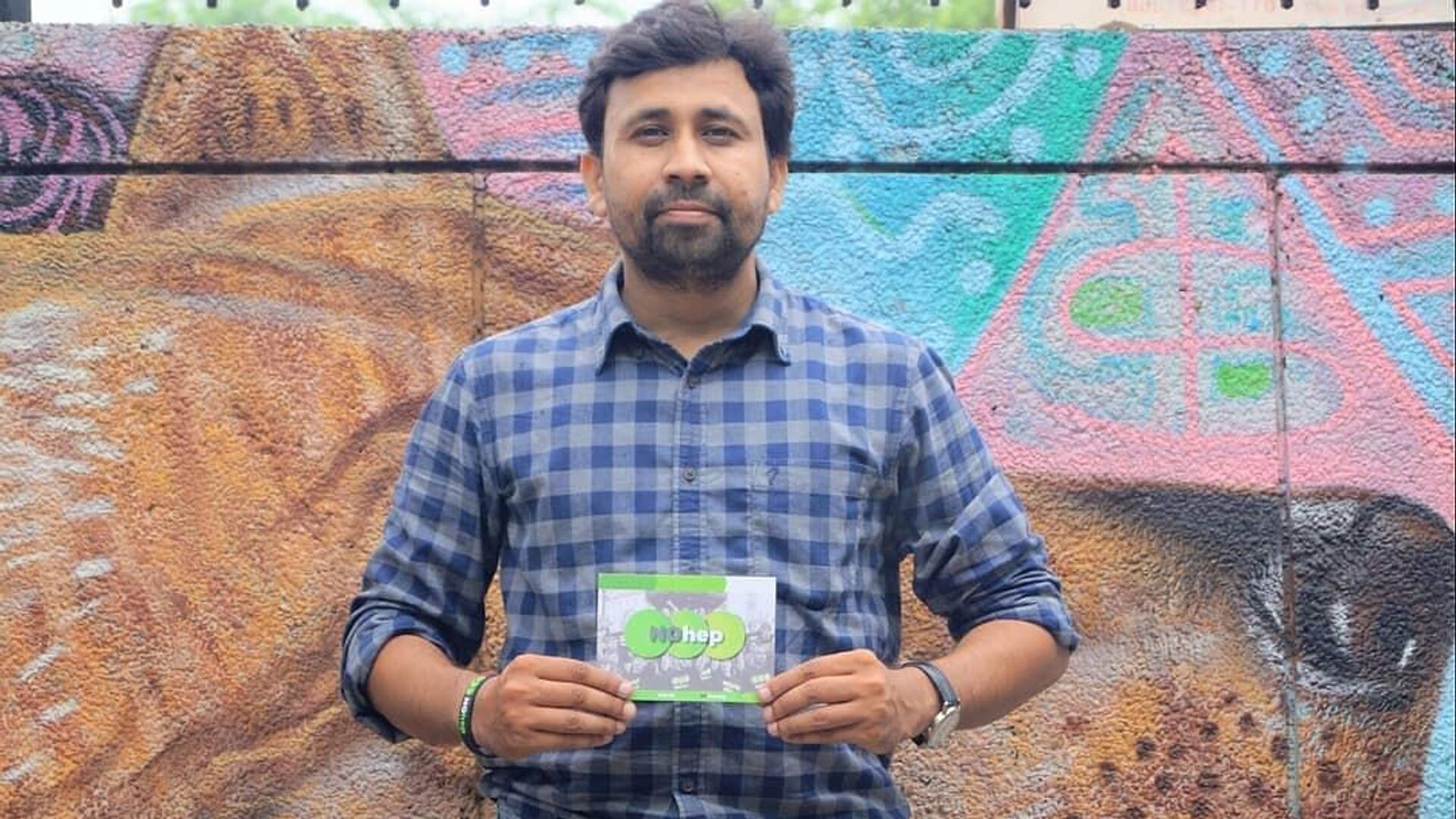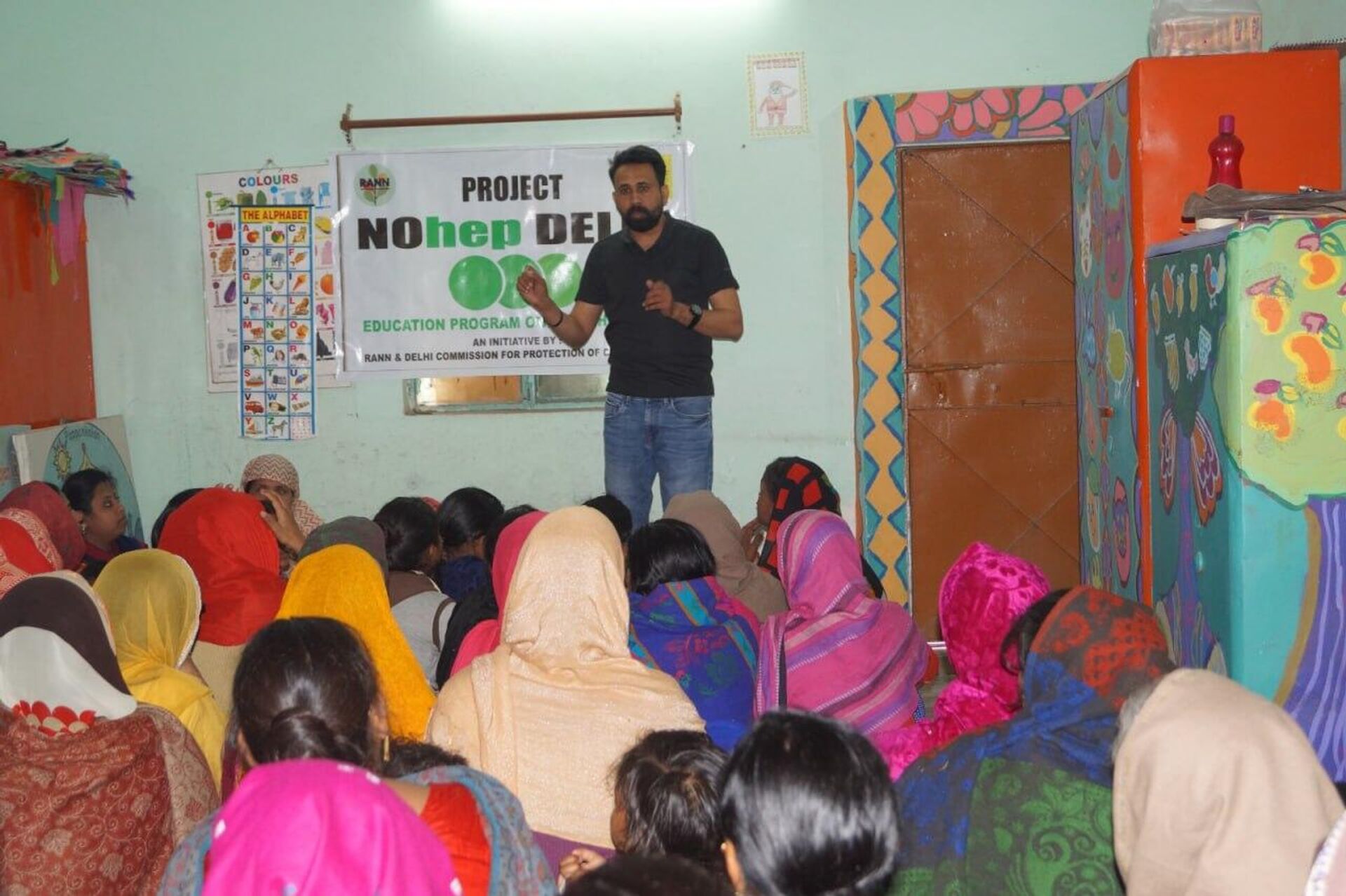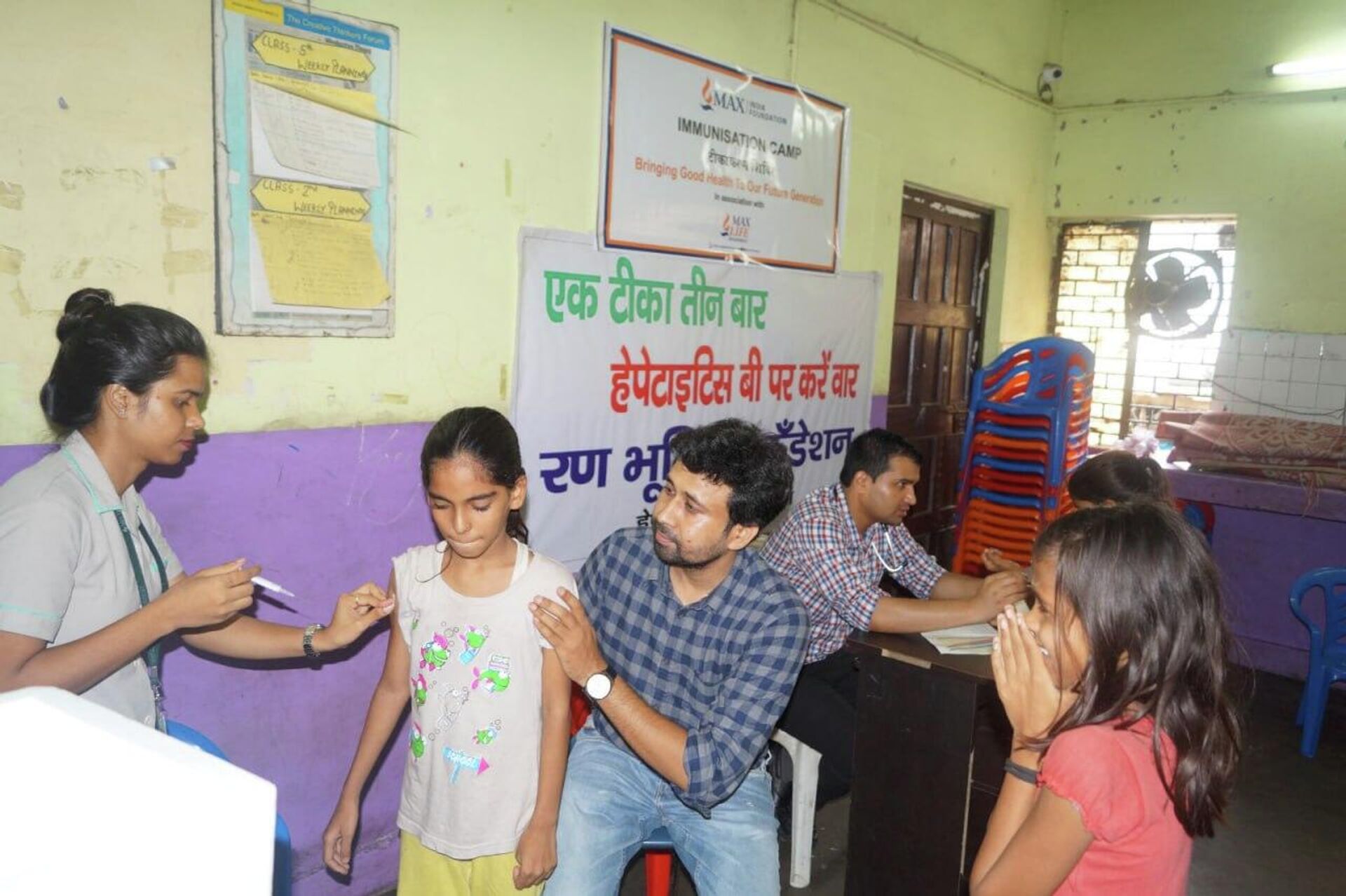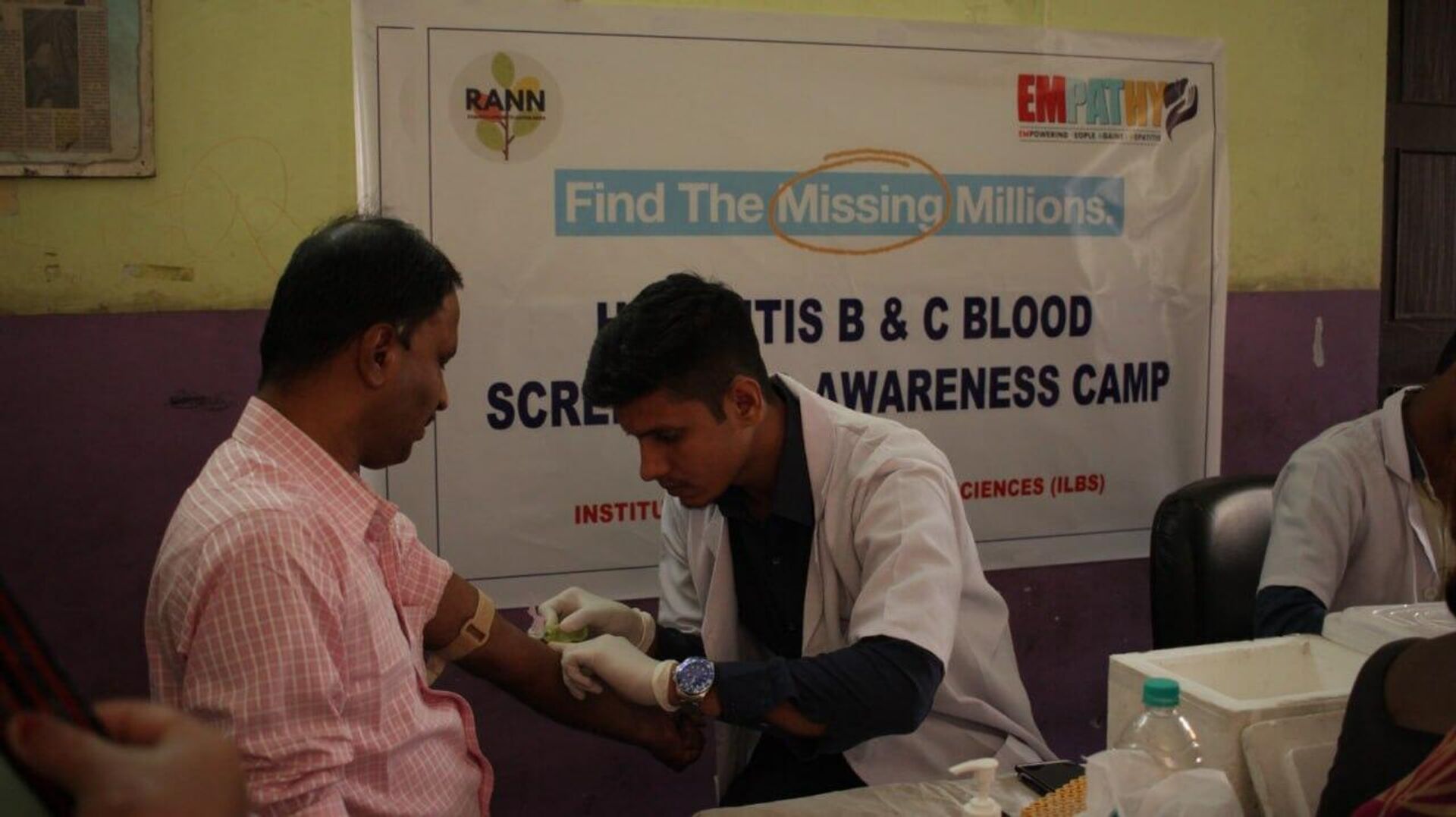https://sputniknews.in/20230728/on-world-hepatitis-day-survivor-shares-his-story-fighting-social-stigma-about-disease-3243981.html
On World Hepatitis Day, Survivor Shares His Story Fighting Social Stigma About Disease
On World Hepatitis Day, Survivor Shares His Story Fighting Social Stigma About Disease
Sputnik India
WHO report says that in India, 40 million people are chronically infected with hepatitis B whereas six to 12 million people are infected with hepatitis C, making the viral disease a serious public health problem.
2023-07-28T17:56+0530
2023-07-28T17:56+0530
2023-07-28T17:56+0530
sputnik exclusives
india
health
health crisis
health issues
the world health organization (who)
social uplifment
vaccination
https://cdn1.img.sputniknews.in/img/07e7/07/1c/3247476_0:0:1081:608_1920x0_80_0_0_e7d226c24c36c461c64539cde3a30b68.jpg
Life took a dramatic turn for a 28-year-old HR Executive working for an MNC in Delhi when he was diagnosed with Hepatitis B during a blood donation drive in 2010.Surprised and unaware of the severity of Hepatitis B, Surender Kumar shared this alarming news with his family that also got screened for the virus.To everyone's shock, three family members were also diagnosed with the silent liver-damaging Hepatitis B virus.Hepatitis – A Silent KillerAccording to Dr. Ankur Jain, a renowned Gastroenterology expert at the Indian Spinal Injuries Centre in Delhi, liver inflammation is caused by different types of Hepatitis viruses, including A, B, C, D, and E.However, he added that there are frequent warning signals like fatigue, appetite loss, a little temperature, nausea, and stomach pain. As the illness worsens, people may develop jaundice, black urine, and pale feces.If left undiagnosed and untreated, Hepatitis B has the potential to worsen and, ultimately, lead to fatal consequences such as liver fibrosis, cirrhosis, or even liver cancer.A report from the World Health Organization (WHO) reveals that South-East Asia is currently grappling with a staggering number of individuals affected by hepatitis. An estimated 100 million people are believed to be living with hepatitis B, while another 30 million are afflicted with hepatitis C. The transmission of the disease poses a significant threat to the region.Transmission of HepatitisFrom unscreened blood transfusions and the use of infected syringes and intravenous drugs to contaminated food or water and unprotected intercourse, hepatitis viruses of different types can be transmitted through various ways.“We got the Hepatitis B virus from my mother, who had got it due to a blood transfusion. My siblings have also been infected. But we could have been prevented from the disease if we had got the vaccination when we were kids. At the time, there was a dire lack of awareness about the disease and its vaccination,” Kumar said.Accept It and Defeat ItFor Kumar, it took him five to six years to come to terms that he will have to live with the disease for the rest of his life.In 2017, Kumar took it upon himself to become an advocate for the prevention of Hepatitis disease and help others in their treatment.Since then, there has been no looking back.Since regions with poor sanitation and hygiene practices, such as inadequate sanitation facilities and contaminated water, are more susceptible to hepatitis infections, Kumar has been holding camps with other stakeholders to run an immunization program, screening people for hepatitis B, and assisting the patients in getting the right treatment.Social Stigma, DiscriminationWhile campaigning, Kumar came across many Hepatitis patients who shared their stories of facing various social stigmas and discrimination when revealing their condition to others.Some were asked to leave or denied jobs and also faced rejection in finding the right partner to marry.Due to social insecurity, some people hide their medical condition at the time of marriage, which resulted in divorce and breaches of trust.Kumar encouraged hepatitis patients to openly confront the challenges and bravely shatter the stigma surrounding the disease by sharing their personal experiences.Though the government has now been running a nationwide vaccination program for the prevention of hepatitis and providing free treatment to the patients, the cost of the treatment at private hospitals and periodic tests and tests can add to the financial burden on people.Kumar emphasizes the urgent need for the government to establish clear guidelines that enable Hepatitis patients to live a normal life, free from discrimination and rejection, both in the workplace and elsewhere.
india
Sputnik India
feedback.hindi@sputniknews.com
+74956456601
MIA „Rossiya Segodnya“
2023
Sangeeta Yadav
https://cdn1.img.sputniknews.in/img/07e6/0c/0f/110602_0:0:641:640_100x100_80_0_0_c298016a79eb02ef8caa9d1f688c12a5.jpg
Sangeeta Yadav
https://cdn1.img.sputniknews.in/img/07e6/0c/0f/110602_0:0:641:640_100x100_80_0_0_c298016a79eb02ef8caa9d1f688c12a5.jpg
News
en_IN
Sputnik India
feedback.hindi@sputniknews.com
+74956456601
MIA „Rossiya Segodnya“
Sputnik India
feedback.hindi@sputniknews.com
+74956456601
MIA „Rossiya Segodnya“
Sangeeta Yadav
https://cdn1.img.sputniknews.in/img/07e6/0c/0f/110602_0:0:641:640_100x100_80_0_0_c298016a79eb02ef8caa9d1f688c12a5.jpg
hepatitis b, surender kumar, alarming, screened for the virus, silent liver-damaging hepatitis b virus, dr. ankur jain, gastroenterology expert, indian spinal injuries centre, delhi, liver inflammation, hepatitis viruses, nausea, stomach pain, jaundice, undiagnosed, untreated, liver fibrosis, cirrhosis, liver cancer, hiv/aids, world health organization, south-east asia, hepatitis c, transmission of the disease, unscreened blood transfusions, infected syringes, intravenous drugs, contaminated food or water, unprotected intercourse, lack of awareness, vaccination, financial burden, rann foundation, nohep project, immunization programme, screening people for hepatitis b, treatment for hepatitis, social stigma, discrimination, social insecurity, nationwide vaccination programme, prevention of hepatitis, cost of the treatment, world hepatitis day, what is hepatitis, what is the cause of hepatitis, what are the symptoms of hepatitis, treatement for hepatitis
hepatitis b, surender kumar, alarming, screened for the virus, silent liver-damaging hepatitis b virus, dr. ankur jain, gastroenterology expert, indian spinal injuries centre, delhi, liver inflammation, hepatitis viruses, nausea, stomach pain, jaundice, undiagnosed, untreated, liver fibrosis, cirrhosis, liver cancer, hiv/aids, world health organization, south-east asia, hepatitis c, transmission of the disease, unscreened blood transfusions, infected syringes, intravenous drugs, contaminated food or water, unprotected intercourse, lack of awareness, vaccination, financial burden, rann foundation, nohep project, immunization programme, screening people for hepatitis b, treatment for hepatitis, social stigma, discrimination, social insecurity, nationwide vaccination programme, prevention of hepatitis, cost of the treatment, world hepatitis day, what is hepatitis, what is the cause of hepatitis, what are the symptoms of hepatitis, treatement for hepatitis
On World Hepatitis Day, Survivor Shares His Story Fighting Social Stigma About Disease
On July 28 every year, World Hepatitis Day is observed to raise awareness about this global health issue. The WHO report is shedding light on the dire state in India, where approximately 40 million individuals are grappling with hepatitis B.
Life took a dramatic turn for a 28-year-old HR Executive working for an MNC in Delhi when he was
diagnosed with Hepatitis B during a blood donation drive in 2010.
Surprised and unaware of the severity of Hepatitis B, Surender Kumar shared this alarming news with his family that also got screened for the virus.
To everyone's shock, three family members were also diagnosed with the silent liver-damaging Hepatitis B virus.
“As a youngster, you have many dreams and aspirations to achieve, and you whole life ahead to live. But when we get to know that you have hepatitis B, which is an incurable disease, you hit rock bottom. It left me mentally disturbed to know that for life long, I will have to be on medicine,” Kumar, who is now in his 40s, told Sputnik.
Hepatitis – A Silent Killer
According to Dr. Ankur Jain, a renowned Gastroenterology expert at the Indian Spinal Injuries Centre in Delhi, liver inflammation is caused by different types of Hepatitis viruses, including A, B, C, D, and E.
“Hepatitis is a silent disease as many times people don’t know that they have the virus. There are few or no early signs and symptoms," Dr. Jain said.
However, he added that there are frequent warning signals like fatigue, appetite loss, a little temperature, nausea, and stomach pain. As the illness worsens, people may develop jaundice, black urine, and pale feces.
If left
undiagnosed and untreated, Hepatitis B has the potential to worsen and, ultimately, lead to fatal consequences such as liver fibrosis, cirrhosis, or even liver cancer.
“The disease kills approximately 1.4 million people every year – more than HIV/AIDS. Around 350 million people around the world are reportedly affected by hepatitis,” Kumar said.
A report from the World Health Organization (WHO) reveals that South-East Asia is currently grappling with a staggering number of individuals affected by hepatitis. An estimated 100 million people are believed to be living with hepatitis B, while another 30 million are afflicted with hepatitis C. The transmission of the disease poses a significant threat to the region.
Transmission of Hepatitis
From unscreened blood transfusions and the use of infected syringes and intravenous drugs to contaminated food or water and unprotected intercourse, hepatitis viruses of different types can be transmitted through various ways.
“We got the Hepatitis B virus from my mother, who had got it due to a blood transfusion. My siblings have also been infected. But we could have been
prevented from the disease if we had got the vaccination when we were kids. At the time, there was a dire
lack of awareness about the disease and its vaccination,” Kumar said.
For Kumar, it took him five to six years to come to terms that he will have to live with the disease for the rest of his life.
“It was a tough battle, starting from accepting the fact that I have Hepatitis B disease which is treatable but can’t be cured. Then getting the right treatment on time. I had support from the family and colleagues at the workplace, so it was not so difficult, but the medication brought many side effects as well as financial burden,” Kumar said.
In 2017, Kumar took it upon himself to become an advocate for the prevention of Hepatitis disease and help others in their treatment.
“I left my job and launched RANN Foundation, an NGO dedicated in spreading awareness about the prevention, early diagnoses and providing proper treatment,” Kumar said adding that it wasn't an easy call to take as he was the only breadwinner of his family.
Since then, there has been no looking back.
“I made my disease my strength, and launched many programs like NoHep and others. Instead of hiding from everyone, I used my life experience to help others educate about its prevention by giving talks,” Kumar said.
Since regions with poor sanitation and hygiene practices, such as inadequate sanitation facilities and contaminated water, are more susceptible to hepatitis infections, Kumar has been holding camps with other stakeholders to run an immunization program, screening people for hepatitis B, and assisting the patients in getting the right treatment.
Social Stigma, Discrimination
While campaigning, Kumar came across many Hepatitis patients who shared their stories of facing various social stigmas and discrimination when revealing their condition to others.
Some were asked to leave or denied jobs and also faced rejection in finding the right partner to marry.
Due to social insecurity, some people hide their medical condition at the time of marriage, which resulted in divorce and breaches of trust.
“Because of the misconception that this disease is somewhat like HIV/AIDS, people hide about the condition. We try to counsel the people and the family of the patient that even hepatitis patients can live a healthy life.”
Kumar encouraged hepatitis patients to openly confront the challenges and bravely shatter the stigma surrounding the disease by sharing their personal experiences.
Though the government has now been running a nationwide vaccination program for the prevention of hepatitis and providing free treatment to the patients, the cost of the treatment at private hospitals and periodic tests and tests can add to the financial burden on people.
Kumar emphasizes the urgent need for the government to establish clear guidelines that enable Hepatitis patients to live a normal life, free from discrimination and rejection, both in the workplace and elsewhere.
“When I told my friends and colleagues, I made them understand that this disease doesn’t spread through eating together or being around the infected person. It is the responsibility of society to create a supportive environment for hepatitis patients and stand shoulder to shoulder with them as they battle the disease,” Kumar said.





